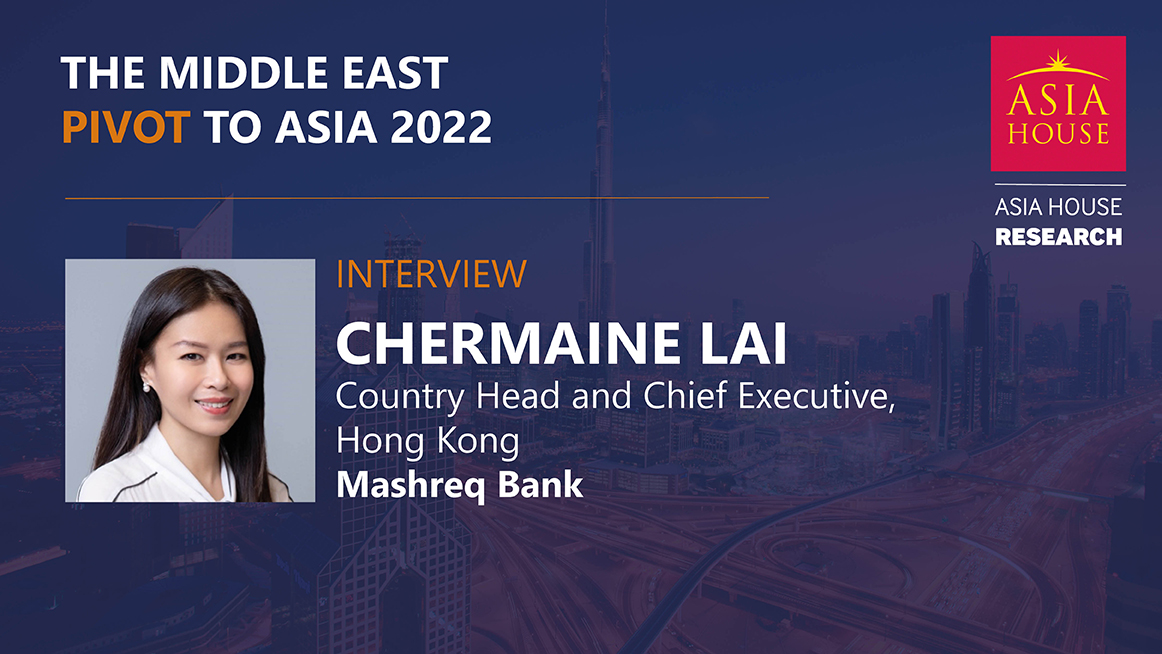Driving commercial and political engagement between Asia, the Middle East and Europe
Driving commercial and political engagement between Asia, the Middle East and Europe
Driving commercial and political engagement between Asia, the Middle East and Europe

Asia House’s research report, The Middle East Pivot to Asia 2022, explores key economic trends emerging between the Gulf and Asia. As part of the research, Freddie Neve, Senior Middle East Associate at Asia House, spoke to Chermaine Lai, Country Head – Hong Kong, Mashreq Bank, to discuss how these shifting trade dynamics are shaping investment between the two regions.
You have represented Mashreq in Hong Kong and East Asia for several years. Have you seen investment rise between the Gulf and East Asia during this period? Which sectors in particular has investment flowed into?
There has been a definite rise in investments both ways. Interestingly, investment has moved away from hydrocarbons and pivoted into technology-focused sectors. While hydrocarbons are still of paramount importance to most Asian countries, we are seeing growing customer inquiries and investments around sectors such as IOT [the internet of things], the development of smart-city infrastructure, data centres, and Cloud technology.
“In the UAE, along with a rise in newer projects led by
Chinese and Asian contractors, the focus on clean and
renewable energy has also been a growing theme this year.”
The Gulf has been able to successfully procure the essential technological capabilities while in return their Asian clients are able to operate in the Gulf through Joint Ventures in order to deliver on these projects.
What has COVID-19’s impact been on Gulf-Asian commercial ties? What is the outlook for recovery?
Although the outlook in China turned gloomier owing to Covid-led lockdowns, one positive that emerged is the notable growth in smart-city technologies. Since the framework for these technological developments were already in place before COVID-19, the pandemic only accelerated the investments into the growth of smart-city infrastructure and operating these cities sustainably using clean energy. With regards to trade, while volumes have not increased substantially, inflation has definitely added to per transaction value. Looking forward, significant recovery is expected in 2023 as manufacturing activity rises owing to the ease in lockdowns. The extent of recovery is dependent on the policy outcomes of the National Congress of the Chinese Communist Party (CCP) later this year.
As you mentioned, investment in renewables is growing. Will high oil prices increase Asian customers’ interest in renewables?
The increased and favourable business interest in renewables is largely government-led or necessitated by policy. We believe the development of mandatory ESG [environmental, social and governance] reporting and high prospect of greater taxation on emissions has increased the interest in renewables.
The China-UAE relationship is significant in terms of driving growth in emerging Asia’s trade with the GCC. What do you think accounts for China’s interest in the UAE market and vice versa?
With regards to the UAE, there is an increasing reliance on the advanced and commercially competitive technological solutions provided by Chinese corporations. The UAE and other Gulf countries have awarded projects to Chinese tech giants notwithstanding the political pressure from traditional Western blocs. Whereas China’s interest in the UAE increased due to the UAE’s neutral stance during the China-American trade war, as a form of strategic hedging.
“The trade between Hong Kong and the UAE has been
overshadowed by the focus on increasing UAE-China trade relations,
and Hong Kong’s nominal interest in domestic sectors
outside the technology and fintech space.”
Additionally, the UAE’s prized status as a re-export hub has empowered China to reach global markets, particularly in Africa which is in line with its interest in free trade and economic cooperation zones. Moreover, Chinese firms are expanding into markets outside of Asia which happen to be significant from Mashreq’s point of view. For example, investments into 5G and industrial projects in Egypt and construction of newer manufacturing bases in the Middle East.
Dubai has introduced a range of reforms, including changes to the working week, new visas, and a strategy to expand its capital markets, to name a few. Has this enhanced Asia’s and Hong Kong’s interest in Dubai?
Mashreq endeavours to seamlessly accommodate capital flows between the GCC and Asian corridors. An interesting trend that we have observed over the last year is the number of Hong Kong based UHNWIs and family offices being set up in Dubai, inquiring about investing in funds offered by commercial banks. Additionally, there are a growing number of inquiries about golden visas to set up new offices in Dubai. We expect this trend to increase, thus indicating the rising interest in Dubai.
The UAE is undertaking several initiatives to encourage digitalisation, fintech, and digital assets. Hong Kong has experience and expertise in these areas. Will this encourage Hong Kong firms to expand into the Middle East? What opportunities exist for Hong Kong businesses to share their expertise with the UAE?
In May 2022, Hong Kong and the UAE participated in a government-led webinar wherein both economies agreed to collaborate towards mutual investment flows, bilateral trade and tech collaboration – which will be deployed in areas such as fintech and smart-city infrastructure. However, we anticipate a plethora of opportunities to take shape in the coming times as the two countries actively collaborate on developing cutting-edge technological solutions and breakthroughs.
The Country Head and CE of Mashreq Hong Kong, as well as its Regional Head for East Asia, Chermaine Lai has worked for the bank since 2008. She has more than 20 years of institutional banking experience covering Asia Pacific and the Middle East, having held roles at various global and regional banks.
This interview is taken from The Middle East Pivot to Asia 2022 report, which highlights key trends emerging in Gulf-Asia trade. Read the report here.
